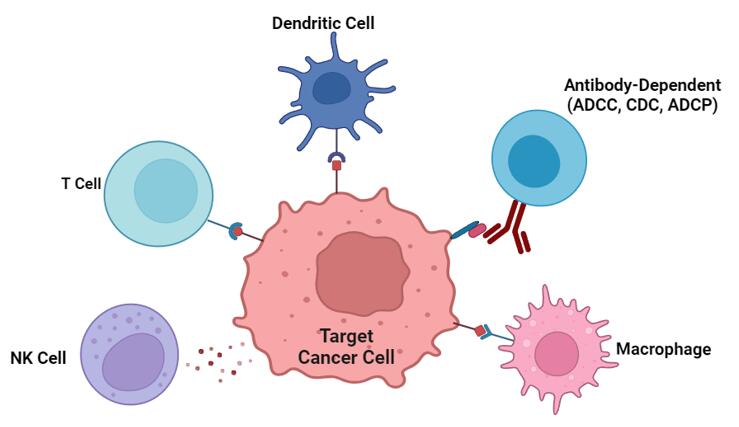Cancer immunotherapy is a revolutionary approach to treating cancer that harnesses the body's own immune system to recognize, attack, and destroy cancer cells. Unlike traditional treatments like chemotherapy and radiation therapy, which directly target cancer cells, immunotherapy aims to enhance the immune system's natural ability to identify and eliminate cancer cells.
Malignant cells are recognized by immune cells through unique mechanisms. Creative Bioarray has devised immune cell-based killing assays employing T cells, NK cells, macrophages, and more. These assays shed light on how new drug candidates impact the immune response against tumors. They help uncover the effectiveness of immunotherapies, whether by bringing cytotoxic immune cells close to tumor targets or by enhancing tumor cell killing through T cell activation and overcoming tolerance.
 Figure 1. Immune Cell-mediated Cancer Cell Killing
Figure 1. Immune Cell-mediated Cancer Cell Killing
Creative Bioarray offers a comprehensive immuno-oncology platform that includes a range of in vitro assays to evaluate the effects of new immunotherapeutic agents on both tumor cells and immune cells. This platform allows researchers to assess the potency of drug candidates in modulating the immune system and potentially reducing tumor growth using cell-based models.
By using Creative Bioarray's immuno-oncology platform, researchers can screen and evaluate new immunotherapeutic agents for their potency to modulate the immune system and reduce tumor growth, potentially leading to the discovery of novel and more effective treatments for cancer. This platform offers a valuable tool for drug development and provides a cost-effective and efficient way to test the efficacy of potential drug candidates before moving forward with in vivo studies.
Online Inquiry